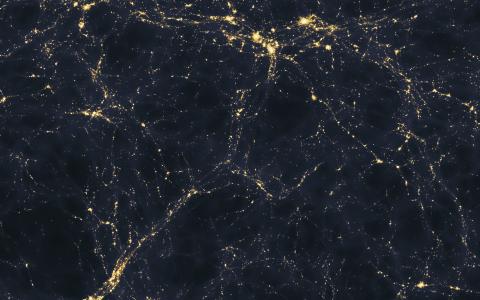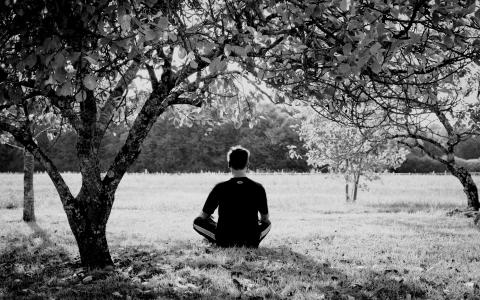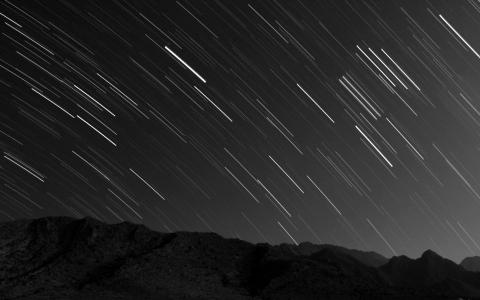
Māyā
Why does this discernment of thought not exist normally in people? Bhagavān answers:
māyāyā’pahṛtajñānāḥ
Māyā has taken away the discerning ability of people.
Māyā is a special mechanism in the operation of prakṛti. It is an error or mistake that arises during an inconsistency during the comprehension of other objects by the mind. Consistency here refers to compatibility; not just a lack of opposition but also positive agreement. It is...

The State of Īśvara
From the perspective of the visible world, the invisible and divisionless part of the universe, Supreme Brahman is known as Īśvara or Parameśvara. When the pure, formless, and actionless Brahman assumes the position of the universal controller, it is known as Parameśvara. There are no differences such as the ruler and ruled in the transcendental state of Brahman. When that consciousness exists as part of the world and is seen...

Summary
Whatever is essential and uniquely great in this world is to be understood as a salient mark of Brahma’s power. Whatever quality endows a thing with usefulness and value belongs to the power of Brahma.
In addition to sattva, the guṇas of rajas and tamas are also necessary for the functioning of the world. The agitation amongst these three guṇas is vital for the constantly dynamic behaviour of the universe and therefore for its existence...

Accomplishment through Practice
It looks as though this principle appealed to Arjuna’s mind, in the course of teaching of the true nature of the ātmā. However, he still had doubts regarding the practice.
cancalaṃ hi manaḥ kṛṣṇa pramāthi balavad-dṛḍham।
tasyāhaṃ nigrahaṃ manye vāyor-iva suduṣkaram॥ BG 6.34
Arjuna says — "Kṛṣṇa, is not the mind fickle? It can impede the path of the jīva and shake it, can it not? Is it possible to bottle up...

Limiting Pleasures
It is not required for a sādhaka practising dhyāna to adhere to valiant restrictions on food and other diversions. His sitting posture should not hinder easy breathing and other bodily activities, and should not cause trouble to his limbs. There is a proper measure for eating, sleeping and jāgaraṇa[1]. A yogi is moderate in the above aspects. Here, moderation means just as much as is required for mental balance; neither more,...

The Advantage of Performing Karma
The idea that the mind becomes pure by performing karma should be examined before acceptance. Even if one is selfish while performing an ordained duty (vihita-karma), its performance by itself can gradually bring about selflessness. Whether it is a spiritual or worldly duty, even if it is done out of selfishness — if it adheres to dharma, its results are two-fold. Firstly, it turns our minds towards the divine;...

Note
jñānārhaté saṃnyāsādé
saṃnyasipudu karmaphalavano karmavano|
enaṃ karmadoḷillaṃ
tānénuvudu seré karmadóḷagadu kaluṣaṃ||
Saṃnyāsa makes one fit for knowledge
What should we give up, karma or its fruit?
Karma itself is pure, faultless.
It only becomes impure by the feeling of ‘I’.
svāntada śodhanéyappudu
santatakarmātta lokasaṃparkagaḷim|
antantaśśodhitadai-
kāntada dṛṣṭiyiné pūrṇatattvaṃ doréguṃ||
The mind is refined
By constant...

The Three Maxims of the Yoga of Action
If we consider the instruction of the Gītā as valuable in all places and at all times, the principles of karmayoga apply to all of us. Why? By karma here is meant not just scriptural and traditional rituals connected to devatās but also all life related activity. Whatever needs to be done to sustain the family – loans and receipts, searches for brides and grooms, squabbles with the in-laws, the good and bad...

The Vision of Equality (Sama-darśana)
This is a famous śloka. What does – sama-darśana - the vision of equality mean? Does equality imply that both the elephant and the cow be offered the same food? The word “equal” is one of the most misused words of our times. Politicians use this word ad nauseam. It is not uncommon for this word to be used without knowing its actual meaning or with an erroneous understanding. Equality is giving to each being...

The Actionless Ātmā
The whole of creation is thus created from Brahma’s power, Brahma’s līlā. It is enjoying ānanda (bliss) causing all these actions. Why do we call it ānanda? Ānanda is the nature of Brahma. Difficulty or pain is not in its nature. Even when we experience distress or sorrow, there is definitely an aspect of its līlā in them. To the divine, our laughter and tears are like the laughter and tears of children to adults. Therefore...
